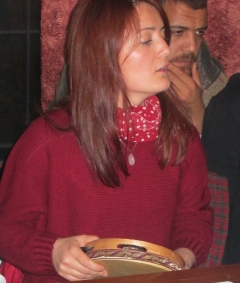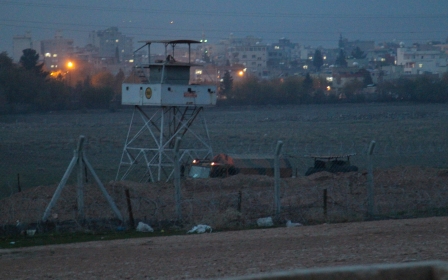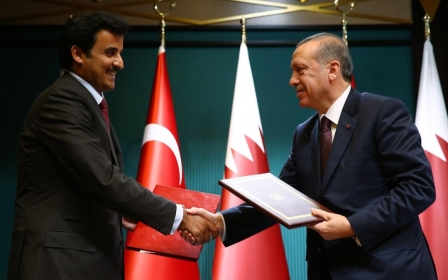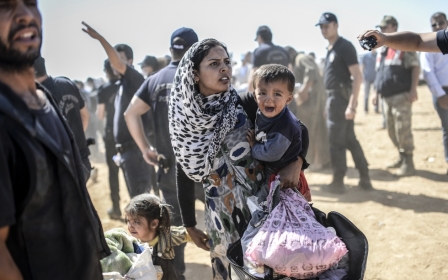Music breaks down borders in Turkey
GAZIANTEP, Turkey – In 2013, Wassim Mukdad was taken captive twice by the regime of Syrian President Bashar al-Assad, and another time by the Islamic State group.
But despite his ordeal, and the ongoing civil war in Syria and IS’ expansion across the country, the 30-year-old Syrian activist and musician never gave up on his passion: in December 2013, he performed a small concert in Yarmouk, a Palestinian refugee camp on the outskirts of Damascus that has been plagued by a dire lack of food and medicine.
But the day after the concert, his friends received credible warnings that both IS fighters and the Syrian military were looking for him.
“They told me to flee,” Wassim, a stocky man with long black hair and a groomed goatee, told Middle East Eye. “The war had become a battle between an Islamist and a military dictatorship.”
Wassim hurriedly packed his belongings and escaped to Lebanon. His girlfriend also fled Syria to meet him in Beirut, and together they boarded a boat one month later, bound for the southern Turkish city of Mersin.
From there, they made their way to the neighbouring city of Gaziantep, arriving on the first day of spring 2014.
Xenophobia-fuelled violence
But the couple’s life in Turkey has not been easy.
They are among approximately one million Syrians that have taken asylum in Turkey, 85 percent of whom are living outside refugee camps and in urban cities.
While the Turkish government has maintained an open border policy for Syrian refugees, offering them temporary protection under a loose legal framework that restricts permanent settlement, the run-up to presidential elections last April saw several politicians play up anti-migrant sentiments to attract votes.
In November 2013, Gursel Tekin, deputy leader of Turkey’s main opposition party, the Republican People’s Party (CHP), claimed that the ruling Justice and Development Party (AKP) was allowing Syrians to vote in order to manipulate the election results.
Less than a year later, in August 2014, Gaziantep erupted in violence after a Syrian tenant stabbed and killed his landlord. Locals sought revenge by attacking buildings housing Syrian refugees, assaulting families in the streets, and burning cars that had Syrian license plates.
Hundreds of residents of an Istanbul suburb also clashed with police that same month, as protesters smashed shop windows, burned cars, and chanted slogans against Syrian refugees.
“We had to be careful,” said Wassim, while smoking a cigarette in his living room. “It was clear nobody wanted us here.”
But while anti-refugee sentiment rose to unprecendented levels, a small community of Turkish musicians welcomed Wassim with open arms.
Overcoming the language barrier
In June 2014, Wassim met Onur Aydin at Narasant, a centre that promotes cultural productions in Gaziantep and where people gather to play music.
“Our government use to always tell us that the Arabs hated the Turks,” explained Onur, a 30-year-old Kurdish-Turkish singer with short dark hair and a thick, bushy mustache. “But after I met Wassim, I realised our politicians had been lying to us the entire time.”
According to a report released by Amnesty International in November 2014, 65 percent of respondents said they wanted the government to stop welcoming Syrian refugees to Turkey, while 30 percent said Syrian refugees already in the country should be sent back.
As harrowing reports of hate crimes last August led the government to relocate 7,800 Syrians to tent camps around Gaziantep province, the escalation also compelled Onur and Wassim to try to use music to bring people together.
Uniting musicians from their respective communities, they formed a band comprised of four Syrians and eight Turkish nationals. Calling themselves Hayal – a word meaning imagination in Arabic, Turkish and Kurdish – they began rehearsing for a multilingual concert in September after Narsanat’s administration allowed the band to use their studio to prepare for the show.
Without a shared language, most band members communicated solely through music, playing the harmonies they needed to learn. If that failed, they relied on the English knowledge of a few other members during rehearsals.
“Body language, face movements, and music, that’s how we communicated,” said Wassim, while putting away his oud after the group's final rehearsal. “We understood each other because we wanted to.”
“We knew the same songs, but in different languages,” said Serap Kerasus, a 30-year old Turkish singer who joined the band.
After calling in a favour with a friend at the municipality, Serap secured the band a place to play their first show: Gaziantep’s concert hall. “I told them that we needed their support to foster dialogue between these communities,” she said.
'Music is borderless'
When the doors opened on 30 November, 500 people from across the country quickly filled the seats.
On stage, Hayal performed classical songs in Arabic and Turkish. Wassim commanded the band with his oud, while Onur and Serap shared lead vocals. The musicians showcased the flute, frame drum and violin, among other instruments, and evoked themes of grief and love in a region scarred by conflict.
“Like us, the crowd was singing to the same songs in their mother tongue,” Serap told MEE, immediately after the show. “Everyone who supported us tonight was a part of something bigger than this event.”
At the end of the show, crowds from all ethnic backgrounds attended a celebration with the band at Narsanat.
Today, Wassim and Onur said they hoped Hayal would gain more supporters in Turkey and beyond, adding that they are determined to perform in cities such as Beirut and Istanbul, and after the war, in Syria, as well.
Meanwhile, the band is preparing for its next concert, which is expected to be held later this month in Urfa, a city in Turkey's southeast that is home to large Kurdish and Arab populations.
“We’ve become a family,” Wassim told MEE, wrapping his arm around Onur. “We might have come from different places, but our music is borderless.”
Middle East Eye propose une couverture et une analyse indépendantes et incomparables du Moyen-Orient, de l’Afrique du Nord et d’autres régions du monde. Pour en savoir plus sur la reprise de ce contenu et les frais qui s’appliquent, veuillez remplir ce formulaire [en anglais]. Pour en savoir plus sur MEE, cliquez ici [en anglais].






